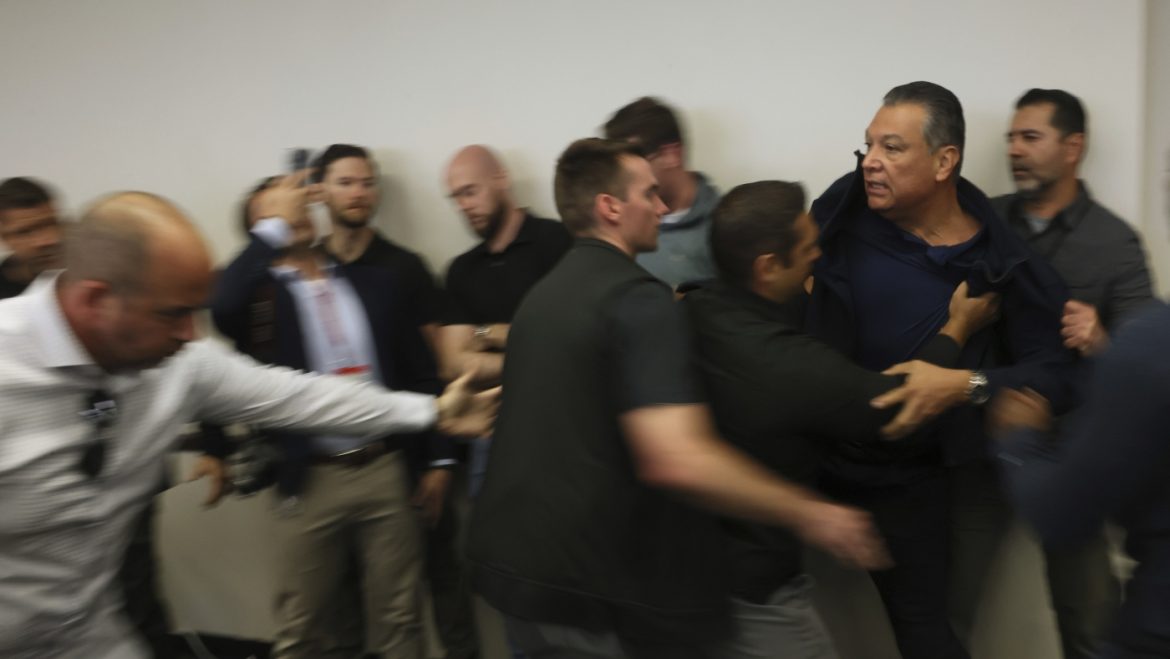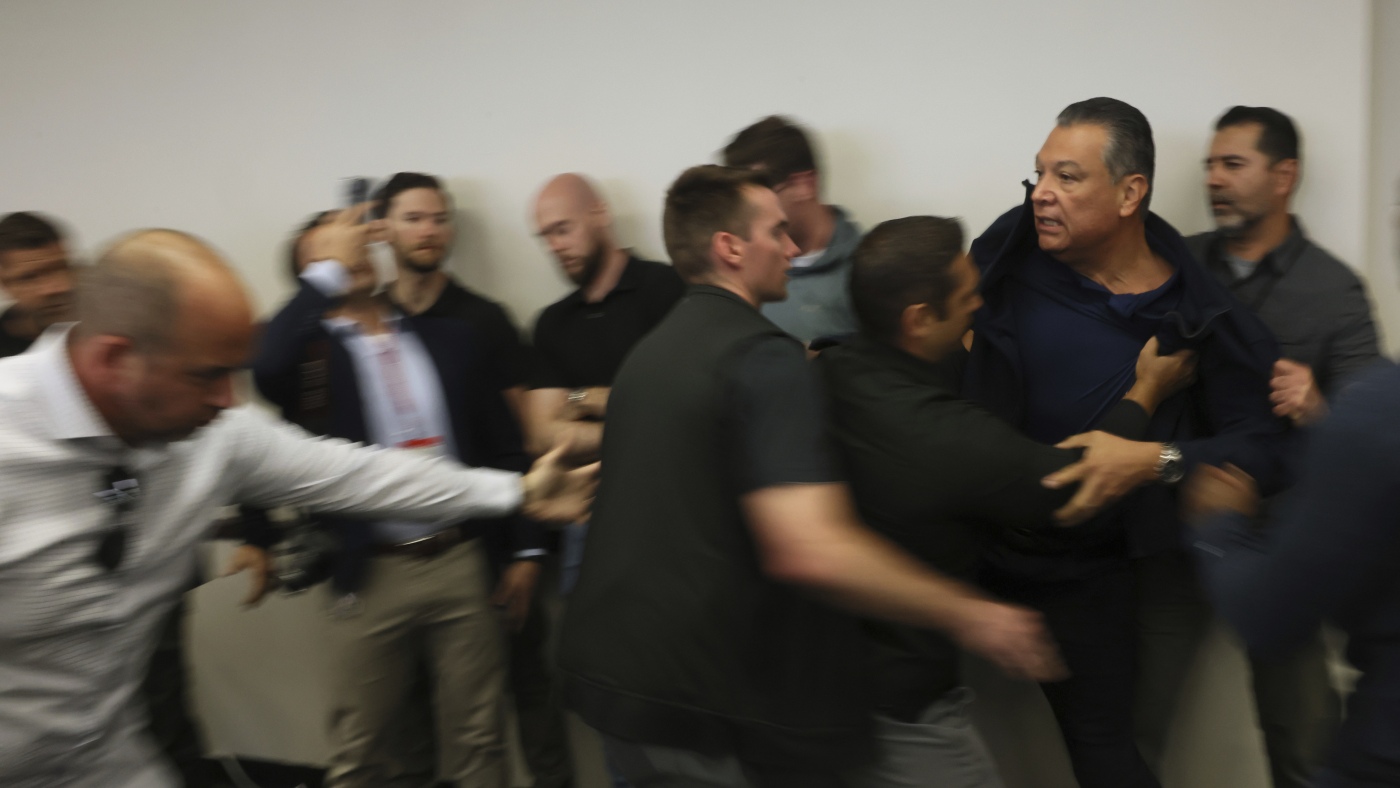Senator Alex Padilla’s forcible removal from Homeland Security Secretary Kristi Noem’s press conference in Los Angeles on June 12, 2025, has sparked widespread attention and controversy. As the senior U.S. Senator representing California and the ranking member of the Senate Judiciary Immigration Subcommittee, Padilla’s attempt to question Secretary Noem during a news briefing about immigration enforcement operations led to his physical removal by federal agents. This report delves into the event’s chronology, the differing perspectives involved, its political and social implications, and the broader context of immigration discourse in the United States.
The Incident: What Happened at the Press Conference
During a press conference held at the Wilshire Federal Building in Los Angeles, Homeland Security Secretary Kristi Noem was addressing her department’s ongoing plans to intensify deportation efforts amid rising immigration protests. Senator Alex Padilla entered the room and attempted to interrupt the Secretary by asking a question related to the event. According to multiple eyewitness accounts and video footage, federal agents immediately intervened. Padilla was forcibly pushed toward the ground, handcuffed, and physically removed from the venue. During the removal, Padilla identified himself as a U.S. Senator, stating, “I have a question for the secretary,” but was nevertheless restrained.
His office clarified that he was not currently detained and indicated ongoing efforts to acquire additional information about the incident. Following the removal, Padilla reportedly met with Secretary Noem privately, though the details of this meeting were not publicly disclosed.
Discrepancies in Accounts and Official Responses
While federal officials and DHS representatives described Padilla’s conduct as disruptive and cited the necessity of maintaining order during the press conference, Padilla’s camp characterized the incident as an egregious overreach infringing on a senator’s right to oversight and public questioning.
Secretary Noem’s team maintained that Padilla’s intrusion was uninvited and alarming, especially as the session was being broadcast live and attended by press. Conversely, Padilla’s office stated that his questioning was both constitutionally appropriate and necessary, particularly given his subcommittee role and the high stakes of DHS policies on immigration enforcement.
The incident prompted calls from various lawmakers, advocacy groups, and commentators for transparency regarding the use of force against an elected official within a government setting. Several expressed outrage against what they perceived as escalation and suppression of dissent, highlighting concerns over the balancing act between security protocols and democratic accountability.
Political and Social Context: Immigration Enforcement and Protest
Padilla’s forcible removal took place against a backdrop of heightened tensions over immigration enforcement in California and nationwide. DHS’s announced intensification of deportation efforts was met with protests, especially in Los Angeles, a city with significant immigrant communities and progressive political leadership historically at odds with federal immigration policy.
Padilla has been a vocal critic of aggressive immigration crackdowns and has promoted legislation such as the Citizenship for Essential Workers Act, aiming to create pathways to citizenship for immigrant workers. His attempt to question Secretary Noem at the press conference can be interpreted not merely as a routine interruption but as a political act underscoring sharp policy divides.
This confrontation symbolically reflects broader polarized debates regarding immigration law enforcement, public safety, and community rights. It highlights the ongoing friction between federal authorities and local or state officials, as well as between political parties over immigration’s impact on social fabric and governance.
The Role of Sen. Padilla and DHS Secretary Noem
Senator Padilla, as ranking member of the Senate Judiciary Immigration Subcommittee, holds a key oversight role in supervising immigration policy execution. His actions at the press conference can be viewed within this remit—seeking accountability and direct answers from the executive branch about the enforcement agenda affecting his constituents. His legislative history of advocating immigrant protections situates his intervention as consistent with his public service record.
On the other hand, Secretary Kristi Noem, a prominent figure in Homeland Security policy, advocates stricter enforcement measures reflecting broader federal priorities. Her press conference aimed to communicate DHS’s operational stance and justify ongoing deportations amidst public scrutiny and backlash. Maintaining control of such events is often vital for the executive branch to present a unified and authoritative narrative.
Implications for Government Transparency and Democracy
The forcible removal of an elected senator raises profound questions about governmental transparency, freedom of speech, and the relationship between elected officials and administrative agencies. It illuminates potential tensions in how government bodies manage dissent and public inquiry, particularly when controversial policies evoke protest or challenge.
Proper engagement between legislators and executive departments is critical for democratic oversight. Physical force used against a senator poses symbolic and substantive issues, suggesting possible erosion of norms governing respectful dialogue and accountability.
At the same time, security protocols exist to preserve order and safety, especially in high-profile federal events. The challenge lies in balancing the legitimate authority of officials to moderate proceedings with the democratic need for open questioning and scrutiny.
Public Reactions and Media Coverage
The event attracted broad media coverage across networks and generated widespread debate on social platforms. Video footage of Padilla’s removal circulated rapidly, fueling partisan discourse. Many commentators criticized the federal agents’ actions as heavy-handed, while others defended the necessity of enforcing rules during official briefings.
Lawmakers from both sides of the aisle called for detailed investigations into the incident. Some viewed it as emblematic of increasing politicization of immigration enforcement, while others raised concerns about escalating confrontations between the political branches.
The episode also spotlighted ongoing protests against immigration policies in Los Angeles, where community organizations have mobilized to oppose federal raids and deportations.
Conclusion: A Moment Reflecting Deeper Divides
Senator Alex Padilla’s forcible removal from Homeland Security Secretary Kristi Noem’s press conference encapsulates a moment of exceptional tension in America’s immigration and political landscape. It underscores the fraught dynamics between elected representatives and executive officials, especially on contentious issues affecting millions of lives.
This incident serves as a vivid example of how procedural boundaries, political convictions, and public safety concerns intersect — sometimes explosively — in the corridors of power. It invites ongoing reflection about how democratic institutions can maintain vigorous debate and oversight without descending into confrontation and physical displacement.
Ultimately, the episode amplifies urgent questions about governance, civil dialogue, and human rights within a polarized nation grappling with immigration’s complexities. Its repercussions will likely influence future interactions between lawmakers, federal agencies, and the public they serve.


